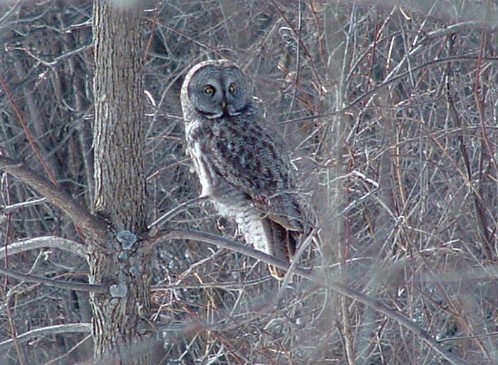|
|
|
WINTER
POPULATION MONITORING |
|
Week 9: Feb 28 - Mar 6, 2005 |
Welcome
to the McGill Bird Observatory weekly report. Click
here for a complete listing of our archives. Comments or questions are welcome at mbo@migrationresearch.org.
|
PICTURE OF
THE WEEK: |
|

March 5,
2005: After a winter of Great Gray Owls being seen in record
numbers
around Montreal, this individual seen today finally marked the
first one observed
at MBO. Perched near the path along the B net line, it was
nearly missed at first.
Though sex is difficult to determine visually in Great Gray Owls,
this individual
seemed to many observers to be particularly small, and is likely a
male. It stayed
in view from the banding station throughout the morning.
(Photo by Shawn Craik)
|
| |
THIS
WEEK |
WINTER
TOTAL |
YEAR
TOTAL |
SITE
TOTAL |
| #
birds (and species) banded |
6
(4) |
226
(13) |
32
(8) |
95-
(48) |
| #
birds (and species) repeat |
2
(1) |
98
(9) |
23
(2) |
201
(17) |
| #
birds (and species) return |
2
(2) |
4
(3) |
4
(3) |
6
(4) |
| #
species observed |
15 |
32 |
22 |
138 |
| #
net hours |
8.0 |
83.0 |
31.0 |
1005.5 |
| #
birds banded / net hour |
75.0 |
271.1 |
103.2 |
94.4 |
|
|
Note: table does
not include nocturnal banding (owls) |
Bander-in-charge:
Marcel Gahbauer
Banding assistants: Shawn Craik, Jean Demers, Christina
Donehower, Sarah Fraser, Marie-Anne Hudson, Julia Mlynarek, Clémence
Soulard
Notes:
Without question, this week's highlight was the sighting on Saturday
March 5 of MBO's
first Great Gray Owl. It was perched fairly low down in one of the
poplars along the "B" ridge, so well camouflaged that several
observers walking down the path didn't discover the owl until almost below
it. The owl showed no great interest in its human audience, and
continued scanning the area for prey. Over the course of the morning
it made a couple of short flights around the rear duck ponds, but most of
the time could be seen in the distance as we went in and out of the
banding cabin. The owl more than compensated for what was a quiet
morning at the nets, largely the consequence of a gusty southwest wind
that made the nets particularly conspicuous. All the same, we did
band yet another Blue Jay, as well as a new American Tree Sparrow, and a
couple each of Black-capped Chickadee and American Goldfinch, the latter
already showing visibly more yellow and black in their plumage compared to
earlier in the winter. Also another two returns today, a
Black-capped Chickadee last recorded in October 2004, and an American Tree
Sparrow not observed since the beginning of last December.
|

